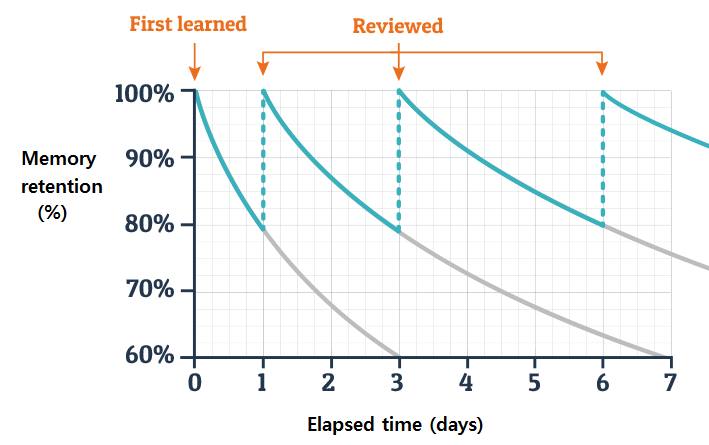English is widely spoken and understood around the world, so it’s no wonder that many people want to learn as much as they can about it. If your goal is to master English, then you need to keep reminding yourself of the practical ways you can do this. The best way to master English is by exposing yourself to the language on a regular basis. Fortunately, English has fewer unique grammar rules than other languages. You don’t have to be an expert in language learning just by reading or listening to English regularly. In fact, with a little preparation, anyone can become an amazing English speaker and writer! Here are 8 practical tips for learning how to master English:
N.B: This article is not for beginners. So which level? Very simple; if you understand this article, then it’s for you.
1- Keep learning (Combat The Forgetting Curve):
There’s no better way to boost your English vocabulary than to continue learning. If you stop learning new words, you’ll forget them faster than you’ll ever be able to re-discover them. That’s why it’s so important to keep reading and writing new vocabulary words. That’s also why it’s a good idea to start a vocabulary notebook. When you write new vocabulary words, you’ll be more likely to remember them and re-discover them down the road.
And here you can see how fast people can forget, “The forgetting curve” hypothesizes the decline of memory retention over time. This curve shows how information is lost over time when there is no attempt to retain/remember it.

Source:
Here is a full article about the topic:
2- Write everything down:
When you learn a language, you need to write everything down. You write down the vocabulary words and phrases you learn. And you write down sentences that use those words and phrases in context with one another. You also record your pronunciation of new words and correct your mistakes as you go.
Writing things down is important for two reasons: It provides a physical record of what you’ve learned. And it gives you practice in writing. Writing is a great way to improve both fluency and accuracy. Not only will you get better at spelling and grammar, but writing helps to build your memory by strengthening the parts of your brain responsible for storing information in long-term memory (your hippocampus) as well as in the actual writing itself (your cerebellum).
3- Talk to native speakers & language learners:
You can’t fully understand a language until you have a basic understanding of how it’s spoken. That’s why it’s important to talk to native speakers of English or other language learners.
You can find native speakers online or in your community.
Online, joining a language exchange program such as Tandem is a great way to practice English. Using the video chat, you’ll be able to communicate with a native speaker using this program. In addition, Inatlantis, which connects language learners with native or advanced speakers, is another good option. It allows users to join and/or schedule personalized group calls based on their own interests.
Offline, meetup.com is one of the easiest ways to join a local community of language learners. You’ll meet other English learners from all walks of life and you’ll have plenty of opportunities to practice your skills.
4- Watch English-language TV shows and movies:
The general rule says: listen and then speak, and so it goes with language learning.
Let’s call it the sponge phase, your ears should absorb English on a daily basis if not an hourly basis. You just have to be exposed to the language as much as you can.
All of the content you consume in your day should be in English; you certainly watch Youtube videos, gaming, vlogs.. You watch movies, series, TV Shows, Anime…
All of this is a golden opportunity for you, and if you don’t use it to your advantage, then maybe you shouldn’t even bother reading this article.
Make sure you activate the subtitle so you can see what’s being said which helps you both build your vocabulary and also know how words are pronounced.
5- Read English-language books:
You’d be surprised at how much you can learn from reading English-language books. This doesn’t mean you have to read a book in one sitting. In fact, it’s better if you can read a few pages at a time every few hours you have free. That’s because as you read, you’ll absorb new vocabulary words and learn more about the language structure. If you have a specific topic or topic you’d like to learn more about, you can also find books that offer in-depth analysis.
However, as a language learner, you don’t have to read complicated technical books. This will only waste your time and get you frustrated.
Also, avoid reading very old books, because what you might learn from these books might be no longer used today, which again will only waste your time.
6- Vocabulary is a living creature:
Context is one of the most important parts of learning vocabulary. If you learn only a handful of new words and never use them in a sentence, they will not be much help to you when you need them in conversation. When you are learning vocabulary, it is important to think about the context in which you will be using it. This can be very simple, such as whether you are speaking alone or with a group of people, but it can also be more complicated, such as whether you are writing a letter or speaking on the phone. It is always best to keep this kind of information in mind so that you can make sure that your vocabulary works in the right context.
There are many different ways to learn English vocabulary, including immersion programs and online resources. Whether it be reading sentences, listening to songs, or watching movies, you need to understand the vocabulary in order to truly understand the meaning of what is being said. But no matter what method you choose, it is always best to study vocabulary within a meaningful context.
Vocabulary should be treated as a living creature, but unfortunately, most people build stand-alone lists of words and try to memorize them, and they end up forgetting them.
7- Imagine situations (Recommended to introverts):

One of the best ways to practice English is to imagine situations and talk to the mirror. Talk about what you did today or what you’re going to do tomorrow. You can also talk about your favorite movies or TV shows. By talking with yourself, you are helping to build your vocabulary and speaking skills.
There are several benefits of practicing English alone, including:
- Improving your concentration and focus
- Building confidence in your ability to speak English
- Practicing your pronunciation
- Practicing your listening skills
There are also some precautions you should take when practicing alone. For example: If you’re not sure if a word is right, look for it, know its pronunciation so that you don’t make a big mistake, because once you learn something, it sticks to your head and you don’t want to spend time learning wrong things.
8- Don’t skip the small talk:
It can be a little daunting to jump straight into more advanced topics, like business and politics, but you should take the time to practice basic skills, like conversation. That way, you’ll be able to communicate with native speakers more easily when you’re ready to communicate with more challenging topics.
Final word:
There’s no other way to say it—to master English, you have to practice. You can’t just learn vocabulary words, you have to use them. So, don’t just write down new words, use them. Use new vocabulary words in everyday conversation and in your essays, papers, and tweets. It may take a little while, but with enough practice, you’ll be able to speak and write fluently in no time.

What a wonderful article, present what the learner needs to improve his language, so basic to understand, and all you need as ways to learn English is written in this article.
Thank you for the hard work to write this article, we need more articles about all what we need to improve our life whether education or lifestyle.
Good luck😊